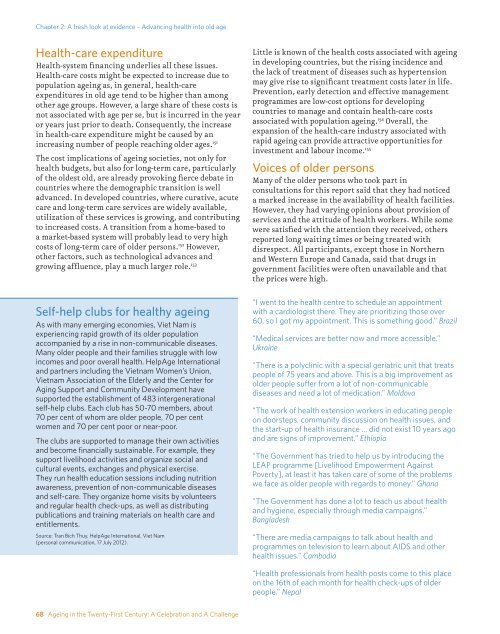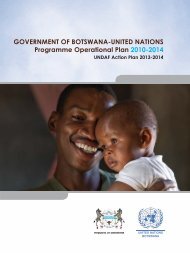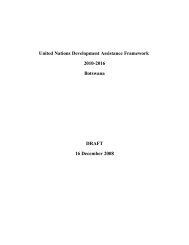Ageing in the Twenty-First Century: - HelpAge International
Ageing in the Twenty-First Century: - HelpAge International
Ageing in the Twenty-First Century: - HelpAge International
Create successful ePaper yourself
Turn your PDF publications into a flip-book with our unique Google optimized e-Paper software.
Chapter 2: A fresh look at evidence – Advanc<strong>in</strong>g health <strong>in</strong>to old age<br />
Health-care expenditure<br />
Health-system f<strong>in</strong>anc<strong>in</strong>g underlies all <strong>the</strong>se issues.<br />
Health-care costs might be expected to <strong>in</strong>crease due to<br />
population age<strong>in</strong>g as, <strong>in</strong> general, health-care<br />
expenditures <strong>in</strong> old age tend to be higher than among<br />
o<strong>the</strong>r age groups. However, a large share of <strong>the</strong>se costs is<br />
not associated with age per se, but is <strong>in</strong>curred <strong>in</strong> <strong>the</strong> year<br />
or years just prior to death. Consequently, <strong>the</strong> <strong>in</strong>crease<br />
<strong>in</strong> health-care expenditure might be caused by an<br />
<strong>in</strong>creas<strong>in</strong>g number of people reach<strong>in</strong>g older ages. 151<br />
The cost implications of age<strong>in</strong>g societies, not only for<br />
health budgets, but also for long-term care, particularly<br />
of <strong>the</strong> oldest old, are already provok<strong>in</strong>g fierce debate <strong>in</strong><br />
countries where <strong>the</strong> demographic transition is well<br />
advanced. In developed countries, where curative, acute<br />
care and long-term care services are widely available,<br />
utilization of <strong>the</strong>se services is grow<strong>in</strong>g, and contribut<strong>in</strong>g<br />
to <strong>in</strong>creased costs. A transition from a home-based to<br />
a market-based system will probably lead to very high<br />
costs of long-term care of older persons. 152 However,<br />
o<strong>the</strong>r factors, such as technological advances and<br />
grow<strong>in</strong>g affluence, play a much larger role. 153<br />
Little is known of <strong>the</strong> health costs associated with age<strong>in</strong>g<br />
<strong>in</strong> develop<strong>in</strong>g countries, but <strong>the</strong> ris<strong>in</strong>g <strong>in</strong>cidence and<br />
<strong>the</strong> lack of treatment of diseases such as hypertension<br />
may give rise to significant treatment costs later <strong>in</strong> life.<br />
Prevention, early detection and effective management<br />
programmes are low-cost options for develop<strong>in</strong>g<br />
countries to manage and conta<strong>in</strong> health-care costs<br />
associated with population age<strong>in</strong>g. 154 Overall, <strong>the</strong><br />
expansion of <strong>the</strong> health-care <strong>in</strong>dustry associated with<br />
rapid age<strong>in</strong>g can provide attractive opportunities for<br />
<strong>in</strong>vestment and labour <strong>in</strong>come. 155<br />
Voices of older persons<br />
Many of <strong>the</strong> older persons who took part <strong>in</strong><br />
consultations for this report said that <strong>the</strong>y had noticed<br />
a marked <strong>in</strong>crease <strong>in</strong> <strong>the</strong> availability of health facilities.<br />
However, <strong>the</strong>y had vary<strong>in</strong>g op<strong>in</strong>ions about provision of<br />
services and <strong>the</strong> attitude of health workers. While some<br />
were satisfied with <strong>the</strong> attention <strong>the</strong>y received, o<strong>the</strong>rs<br />
reported long wait<strong>in</strong>g times or be<strong>in</strong>g treated with<br />
disrespect. All participants, except those <strong>in</strong> Nor<strong>the</strong>rn<br />
and Western Europe and Canada, said that drugs <strong>in</strong><br />
government facilities were often unavailable and that<br />
<strong>the</strong> prices were high.<br />
Self-help clubs for healthy age<strong>in</strong>g<br />
As with many emerg<strong>in</strong>g economies, Viet Nam is<br />
experienc<strong>in</strong>g rapid growth of its older population<br />
accompanied by a rise <strong>in</strong> non-communicable diseases.<br />
Many older people and <strong>the</strong>ir families struggle with low<br />
<strong>in</strong>comes and poor overall health. <strong>HelpAge</strong> <strong>International</strong><br />
and partners <strong>in</strong>clud<strong>in</strong>g <strong>the</strong> Vietnam Women’s Union,<br />
Vietnam Association of <strong>the</strong> Elderly and <strong>the</strong> Center for<br />
Ag<strong>in</strong>g Support and Community Development have<br />
supported <strong>the</strong> establishment of 483 <strong>in</strong>tergenerational<br />
self-help clubs. Each club has 50-70 members, about<br />
70 per cent of whom are older people, 70 per cent<br />
women and 70 per cent poor or near-poor.<br />
The clubs are supported to manage <strong>the</strong>ir own activities<br />
and become f<strong>in</strong>ancially susta<strong>in</strong>able. For example, <strong>the</strong>y<br />
support livelihood activities and organize social and<br />
cultural events, exchanges and physical exercise.<br />
They run health education sessions <strong>in</strong>clud<strong>in</strong>g nutrition<br />
awareness, prevention of non-communicable diseases<br />
and self-care. They organize home visits by volunteers<br />
and regular health check-ups, as well as distribut<strong>in</strong>g<br />
publications and tra<strong>in</strong><strong>in</strong>g materials on health care and<br />
entitlements.<br />
Source: Tran Bich Thuy, <strong>HelpAge</strong> <strong>International</strong>, Viet Nam<br />
(personal communication, 17 July 2012).<br />
“I went to <strong>the</strong> health centre to schedule an appo<strong>in</strong>tment<br />
with a cardiologist <strong>the</strong>re. They are prioritiz<strong>in</strong>g those over<br />
60, so I got my appo<strong>in</strong>tment. This is someth<strong>in</strong>g good.” Brazil<br />
“Medical services are better now and more accessible.”<br />
Ukra<strong>in</strong>e<br />
“There is a polycl<strong>in</strong>ic with a special geriatric unit that treats<br />
people of 75 years and above. This is a big improvement as<br />
older people suffer from a lot of non-communicable<br />
diseases and need a lot of medication.” Moldova<br />
“The work of health extension workers <strong>in</strong> educat<strong>in</strong>g people<br />
on doorsteps, community discussion on health issues, and<br />
<strong>the</strong> start-up of health <strong>in</strong>surance … did not exist 10 years ago<br />
and are signs of improvement.” Ethiopia<br />
“The Government has tried to help us by <strong>in</strong>troduc<strong>in</strong>g <strong>the</strong><br />
LEAP programme [Livelihood Empowerment Aga<strong>in</strong>st<br />
Poverty], at least it has taken care of some of <strong>the</strong> problems<br />
we face as older people with regards to money.” Ghana<br />
“The Government has done a lot to teach us about health<br />
and hygiene, especially through media campaigns.”<br />
Bangladesh<br />
“There are media campaigns to talk about health and<br />
programmes on television to learn about AIDS and o<strong>the</strong>r<br />
health issues.” Cambodia<br />
“Health professionals from health posts come to this place<br />
on <strong>the</strong> 16th of each month for health check-ups of older<br />
people.” Nepal<br />
68 <strong>Age<strong>in</strong>g</strong> <strong>in</strong> <strong>the</strong> <strong>Twenty</strong>-<strong>First</strong> <strong>Century</strong>: A Celebration and A Challenge







